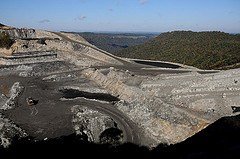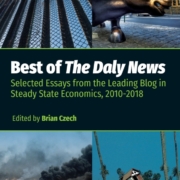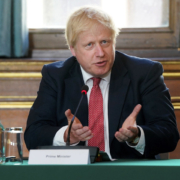Potential New Allies in the Effort to Achieve a Sustainable True Cost Economy
by Brent Blackwelder
 Those who want a true cost, steady state economy need some new, powerful allies. We need allies that stretch across the political spectrum, from liberal to conservative. We need allies that can speak from a values perspective to bring moral considerations to bear on the discussion.
Those who want a true cost, steady state economy need some new, powerful allies. We need allies that stretch across the political spectrum, from liberal to conservative. We need allies that can speak from a values perspective to bring moral considerations to bear on the discussion.
Neither the environmental movement nor the progressive movement possesses enough political strength to overcome the most powerful economic interests in the world. These potent interests include the oil and coal industries, banks, agribusiness, mining and chemical companies, Wall Street, etc. Congress will not act on big economic changes because too many members depend on election money from these very same economic interests.
Faith-based communities could play an important role because they can reach across the conservative-liberal spectrum, have member congregations that convene on a weekly basis, and can speak with a moral voice that moves people to action. Such an approach may work well with the growing number focused on serious environmental problems because the root cause of many of such problems is the system of cheater economics that dominates today’s economy.
During the 1970s and 1980s, some of us worked with churches on various environmental concerns. These efforts have been expanding and today, the environment is a common topic among the faithful. For example, consider the mission statement of Interfaith Power & Light, established over a decade ago by Reverend Sally Bingham:
The very existence of life–life that religious people are called to protect–is jeopardized by our continued dependency on fossil fuels for energy. Every major religion has a mandate to care for Creation. We were given natural resources to sustain us, but we were also given the responsibility to act as good stewards and preserve life for future generations.
Interfaith Power & Light has engaged hundreds of congregations, has affiliates in 38 states, educated thousands of people of faith about the moral mandate to address global warming, and helped pass California’s landmark climate and clean energy laws. Christian environmentalists such as Matthew and Nancy Sleeth have formed an educational group, Blessed Earth, to equip faith-based communities to become better stewards of the earth and have written books about the duty of caring for creation, including Almost Amish; The Gospel According to the Earth; and Go Green, Save Green. To illustrate this point, I present a sample of five defects in today’s unsustainable economy, followed by the kind of response faith-based communities could make.
- Defect: Assigning future generations close to zero value and obsessively focusing on the quarterly return. Rapacious commercial logging, for instance, can wipe out forests that are needed to sustain future generations with water, fuel, fish, and wildlife.Moral Response: We care about future generations and have a responsibility to care for the environment and not leave a polluted earth for our children and grandchildren.
- Defect: Pushing for massive expansion of the consumer economy. Today’s economy is involved in a relentless drive to sell a never-ending array of consumer goods.Moral Response: Most denominations preach against excessive materialism. (“Lay not up for yourselves treasures on earth where moss and rust doth corrupt and where thieves break through and steal.” Matthew 6:19)
-

Faith-based communities can become powerful allies in the fight to stop growth at all costs, including the once forested Kentucky mountains. Photo Credit: James Holloway
Defect: Offering economic justifications for extraordinary environmental destruction, such as mountain-top coal removal mining.
Moral Response: Such practices are an attack on the earth and cause serious harm to local residents–their health, their water supply, and their homes, leaving the once biologically forested mountains of West Virginia with a Martian landscape.
- Defect: Permitting enormous pollution externalities to be shoved off on fellow competitors and on the public. Today’s economy tolerates cheater economics in which products do not reflect the real ecological costs of their manufacture and usage.Moral Response: We are charged with loving our neighbors, not poisoning them. Prices of consumer goods should reflect the damages being done to obtain the raw materials and energy used in their production and in their usage or consumption.
- Defect: Counting population growth as an asset when in most places it is a liability that pushes localities as well as states to exceed the carrying capacity of their environment. None of the great challenges to the health of the earth’s life-support systems are made easier by having more people. World population today exceeds 7 billion and is headed to between 9 and 11 billion by 2050. The tax code in many places encourages more population growth and the global economy depends on a growing supply of cheap labor.Moral Response: While there is a large rift among religious denominations over the question of abortion, the population question is directly addressed in Chapter 1 of Genesis. The blessing “be fruitful and multiply” is first given to every kind of animal, including crawling things, then to humans. Thus, humans must take their blessing in the context of the previous blessings by God and live so that the earth is flourishing with many kinds of life.
In summary, those who seek a true cost, steady state economy should work with faith-based communities to discuss how the crucial linkage between serious problems like climate disruption and new economic policies to achieve a sustainable economy fit into their work.
By raising objections to cheater economics, to pollution externalities, and to phony benefit-cost analyses used to justify grotesque environmental practices (such as tar sands oil and mountain top removal), faith-based communities will make a difference. These coummunities can speak with moral authority about caring for future generations, about caring for God’s creation, and about loving one’s neighbors–not polluting them.
Note: Brent Blackwelder received a Ph.D. in moral philosophy from the University of Maryland in 1975 and was awarded an honorary doctorate from the Virginia Theological Seminary in May of 2014.







Thank you! i have been pushing this idea for some time – it seems that “lefties” too often dismiss or even deride communities of faith – opposing them to “science” and “reason” that lefties pride themselves in – I think they are shooting themselves in the foot, or other parts of their anatomy, in terms of advancing the causes they support, by doing so …
Yes, Aquifer, it is almost as if there exists here a ‘dichotomy’ in the subscribers to a steady state economy. I could be doing the left side of politics a huge injustice and be entirely wrong, but nevertheless I do agree that their propensity to discard their religious convictions in favour of science and reason – which they proudly proclaim as ‘enlightenment’ – usually renders them far more materialistically driven than those of the faithful. Interesting.
Blackwelder,
I agree that we need allies [lots of them!] that can speak from a values perspective to bring moral considerations on the efforts to achieve a sustainable true cost economy. The 1986 one week long AuSable Conference on Planetheonomics focused on that [stewarding the Planet according to the will of Theo] and I was pleased that Herman E. Daly accepted the challenge of being its key-note speaker.
Overby
As usual an excellent contribution by Brent Blackwelder, thank you. In the same vein I came across the following article in an interfaith website which, I believe, reinforces what he says.
http://www.tikkun.org/nextgen/debtors-all-facing-and-embracing-our-ecological-indebtedness